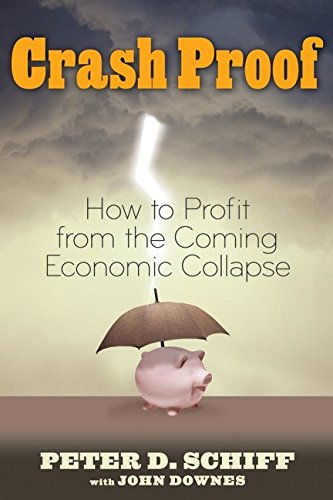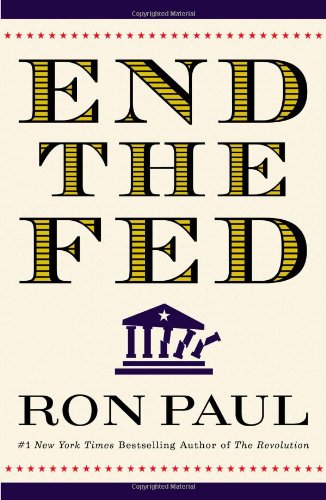Recently by Peter Schiff: No Exit for Ben
The editors of the Daily Bell are pleased to publish this exclusive interview with free-market financial advisor Peter Schiff who founded the successful investment firm of Euro Pacific Capital and is contemplating running for Senator from Connecticut.
Introduction: Peter Schiff is one of the few non-biased investment advisors to have correctly called the current bear market before it began and to have positioned his clients accordingly. He has been quoted in many of the nation’s leading newspapers, and appears regularly on CNBC, CNN, Fox News, Fox Business Network, and Bloomberg. His best-selling book, Crash Proof: How to Profit from the Coming Economic Collapse was published by Wiley & Sons in February of 2007. His second book, The Little Book of Bull Moves in Bear Markets: How to Keep your Portfolio Up When the Market is Down was published by Wiley & Sons in October of 2008. An expert on money, economic theory, and international investing, Peter is a highly recommended broker by many leading financial newsletters and investment advisory services. He is also a contributing commentator for Newsweek International and served as an economic advisor to the 2008 Ron Paul presidential campaign.
Daily Bell: Thanks for sitting down with us. We are most grateful for all you have accomplished — and are yet to accomplish.
Peter Schiff: It is my pleasure.
Daily Bell: Are you going to run for Senate in Connecticut?
Peter Schiff: It is under serious consideration. I am working with some political consultants to evaluate the pros and cons. I expect to make an announcement one way or the other this summer.
Daily Bell: If you did run, could you win?
Peter Schiff: I don’t know; that’s what I trying to determine. I am not a politician, and there is a limit to how much of the political game I am willing or able to play. Hopefully, if the citizens of Connecticut are not ready to abandon capitalism and can embrace a candidate who represents a real change, then I think I have a chance.
Daily Bell: What do you think you could accomplish in Washington?
 Crash Proof: How to Pr...
Best Price: $0.10
Buy New $8.99
(as of 12:00 UTC - Details)
Crash Proof: How to Pr...
Best Price: $0.10
Buy New $8.99
(as of 12:00 UTC - Details)
Peter Schiff: As a senator, you are just 1 in 100. A single senator can’t make policy. But I hope that I would be in a position to influence the debate on America’s economic future at a very critical time. The dollar has long benefitted from its reserve status, and that is a very simple reason why the U.S. has maintained its prosperity — even when our economy can no longer provide it. Ultimately, I believe that the world at large will move away from a dollar-based reserve system. That will pull the rug out from under our phony economy.
Daily Bell: Where do you think this central banking approach to economic development is headed? Do you think it will eventually succeed as a global force — generating a global central bank, etc?
Peter Schiff: I think that in the end, central bankers controlling fiat money will prove to be an unworkable and inherently flawed system. Despite the apparent distinction, central bankers are politicians who are more concerned about rosy economic statistics than they are about sound currency. This can only lead to devalued currencies, which sooner or later becomes a major issue. A global central bank would be a disaster.
Daily Bell: You were a fierce opponent of Alan Greenspan when he was Fed chairman.
Peter Schiff: I wrote a number of columns about Greenspan in the early 2000s. One of my main gripes was that Greenspan downplayed the amount of inflation that the central bank was injecting into the economy by printing more paper dollars than the economy could handle.
As an apologist for the current system, Greenspan often provided statements to Congress that tended to present the American economy dis-connected from the rest of the world. American monetary policy could work on its own and inflation was low because monetary policy was appropriate. He never mentioned that most of the money being printed was being stashed in Chinese vaults — effectively keeping price inflation at bay.
At the same he was keeping rates artificially low, thus injecting more money and credit into the economy than it could adequately make use of. By putting too much money and credit into the system, the Fed fueled "bubbles" in various parts of the economy. The distortion went right to businesses’ bottom line. Fooled by easy money, businesses were apt to mis-allocate resources.
Daily Bell: Let’s go back a little. Your father is well known for his courageous crusade against excessive American income taxes. Do you stay in touch with him? Is he okay?
 The Little Book of Bul...
Best Price: $0.05
Buy New $1.99
(as of 05:25 UTC - Details)
The Little Book of Bul...
Best Price: $0.05
Buy New $1.99
(as of 05:25 UTC - Details)
Peter Schiff: I do stay in touch with him. He is currently four years into a 13-year sentence for tax evasion. He is incarcerated in a federal prison in Terre Haute, IN. He’s 81 years old, and his health is not the greatest, but he’s generally okay. Although he clearly would prefer to have freedom. It’s a shame that the government would try so hard to paint him as a charlatan and a thief when he was essentially taking a principled stand against what he strongly believed to be the federal government’s illegal collection of income taxes.
Daily Bell: You tend in your public speaking to concentrate more on the Federal Reserve than the income tax when it comes to identifying what is the most damaging financial and economic mechanism. Why do you think central banking is more of a menace than graduated income taxes? Or do you?
Peter Schiff: They are both damaging, and our economy would clearly be better off without them. However, relative to the recent financial crisis and the housing bubble, clearly the Fed was more to blame than the income tax.
Daily Bell: As a broker, you were prescient about the economic crisis. How come you don’t get more credit?
 End the Fed
Best Price: $1.12
Buy New $8.53
(as of 10:10 UTC - Details)
End the Fed
Best Price: $1.12
Buy New $8.53
(as of 10:10 UTC - Details)
Peter Schiff: Economics at the academic and policy level is still almost completely dominated by Keynesians who believe in government’s ability to steward economic growth through fiscal and monetary policy. The fact that I predicted the current meltdown, and they did not, is seen by many to be nothing more than a "stopped clock" finally being right. Of course, this dismissal ignores the detailed accuracy of my forecasts and the performance of my investment choices over the decade preceding the crash.
I’m proud of my predictions, for instance, regarding the housing bubble and subsequent housing crunch. The housing collapse, however, is front-and-center everywhere you look in the business sections of newspapers and magazines. Denied and minimized throughout the 2000s, the proverbial chickens have come home to roost. What is both exasperating and astonishing is that very few predicted the aggressiveness of the problem or the seriousness of its unraveling. We got it right when others were either avoiding the issue or lacked the courage to confront it head on.
You know, until very recently, despite the unraveling of the US mortgage market, the official line remained upbeat. And today, there’s a chorus about green shoots. There aren’t any green shoots. Just as the current real estate market is no buying opportunity, or not unless you want to spend your life organizing renters and waiting up to a decade or longer for the housing market to recover.
The American mortgage market is in full-scale retreat, and that’s an alarm we sounded over and over. We were correct then and we were correct about our analysis of the bailout as well.
Daily Bell: With all that has taken place, why is the Federal Reserve being rewarded with yet more regulatory power, given its track record?
Peter Schiff: Because more power concentrated in Washington serves the interests of government.
Daily Bell: Is it possible that the Fed is on its way out, given current resistance to it? Will something more menacing replace it, perhaps the IMF?
Peter Schiff: I do not know. Certainly if we simply turn over the printing press to Congress, the situation could be even worse. Reforming the Fed could be more practical than abolishing it. But the worst is not yet over if you are willing to face the true ramifications of the monetary and fiscal fallout. I do my own research, trust my own instincts and come to conclusions that accurately reflect the realities of the world we live in. That’s why we were able to come to a conclusion in the early 2000s that the dollar was not nearly in as good shape as official rhetoric offered. We weren’t reluctant to say it either — that the rhetoric surrounding America’s economic situation and the investment opportunities it offered its citizens was growing more fanciful even as the situation grew more dire.





